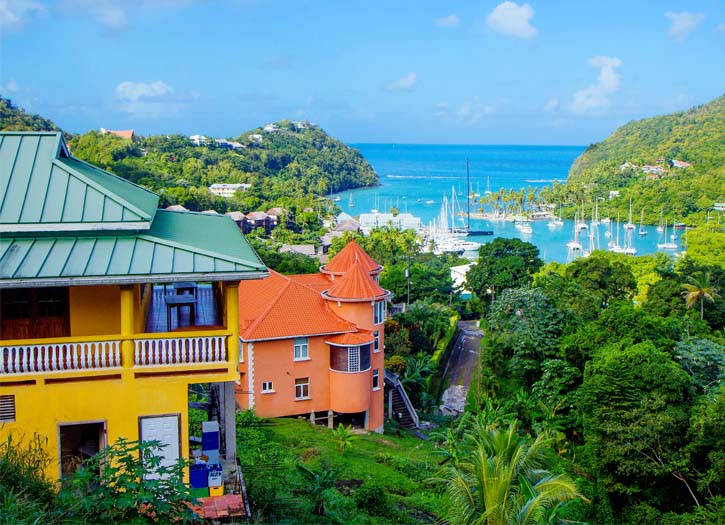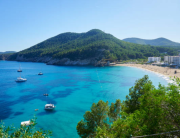The COVID-19 pandemic in Saint Lucia is part of the ongoing global viral pandemic of coronavirus disease 2019 (COVID-19), which was confirmed to have reached Saint Lucia on 13 March 2020.As of 8 October, there are a total of 28 confirmed cases, of which 27 have recovered and no deaths have occurred.
On 13 March, the first case in Saint Lucia was confirmed.The patient was a 63-year-old woman with a travel history from the United Kingdom.The Department of Health and Wellness confirmed a second case on 14 March.The patients were repatriated to the United Kingdom on the 24 and 25 March. On 20 March, Prime Minister Allen Chastanet announced that Saint Lucia would implement social distancing measures, including the suspension of nonessential commercial activity from 23 March through 5 April.The government also imposed a 11 p.m. to 5 a.m. curfew. On 29 March, the Prime Minister extended the shutdown to 14 April and extended the curfew.
On 23 March, the Government of Saint Lucia declared a state of emergency and announced the closure of the country’s airports to incoming passenger flights until 5 April.On 29 March, the government banned the sale of alcoholic beverages, as well as suspending all liquor licenses, and closing all bars.On 31 March, the Prime Minister announced a 24-hour curfew confining all persons to their place of residence from 5 a.m. 1 April to 5 a.m. 7 April.At the time of the announcement, persons were already under curfew meaning they could not make any arrangements for the new curfew.
On 8 April, a social stabilization program was announced for people who had become unemployed as a result of the coronavirus pandemic, or who were vulnerable, and an economic support package for businesses.Sarah Flood Beaubrun, Minister for External Affairs, announced that they were working with the United States and Canada to return Saint Lucians stranded abroad. On 12 April, the government extended the 10-hour 7 p.m. to 5 a.m. curfew and partial commercial shutdown through 26 April. The government added hardware and home supply stores to the list of businesses permitted to operate.
On 22 April, Chief Medical Officer Dr. Sharon Belmar-George announced that all 15 of the country’s confirmed cases had recovered, including those at high risk because of their age or preexisting conditions. All measures including the curfew would remain in effect. On 28 April, there were 17 confirmed cases, of which 15 had recovered. On 30 April, the World Bank announced it would provide US$10.5 million to Saint Lucia for their COVID-19 response.
On 8 May, the government partially lifted the ban on the sale of alcohol, allowing it in stores.On 18 May, the Ministry of Commerce permitted businesses to resume full operations during normal business hours. Curfew hours were changed as well to 9 p.m. to 5 a.m. Schools and cinemas remained closed and mass crowd events were still prohibited.On 19 May, Tourism Minister Dominic Fedee announced a phased reopening of Saint Lucia’s tourism industry, starting with the reopening of borders to international flights starting 4 June 2020.
Travelers would be required to obtain a negative PCR (Polymerase chain reaction) test within seven days of travel unless they are arriving from countries in a travel bubble designated by the Government of Saint Lucia.The travel bubble included Antigua and Barbuda, Aruba, Anguilla, The Bahamas, Barbados, Bermuda, Bonaire, British Virgin Islands, Curaçao, Dominica, Grenada, Guyana, Jamaica, Montserrat, Saint Barthélemy, Saint Kitts and Nevis, Saint Martin, Saint Vincent and the Grenadines, Trinidad and Tobago, and Turks and Caicos Islands.On 6 July, the Prime Minister announced that the nightly curfew will be lifted on 10 July. He also announced the reopening of cinemas, early childhood development centers, and sporting events.
On 1 September 2020, the Ministry of Health and Wellness announced that the last remaining COVID-19 patient has recovered. On 1 September 2020, the St. Lucia Tourism Authority announced the easing of restrictions for visitors. Visitors are allowed to stay at up to two of the COVID-19 certified hotels and resorts on the island and may enjoy water-based activities. Returning nationals and residents will be required to undergo a 14-day quarantine.







Add Comment
You must be logged in to post a comment.